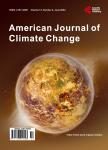A Participatory Assessment of the Impact of Flooding in Some Communities in Lokoja, Kogi State, Nigeria
A Participatory Assessment of the Impact of Flooding in Some Communities in Lokoja, Kogi State, Nigeria作者机构:African Regional Centre for Space Science and Technology Education in English (ARCSSTE-E) Obafemi Awolowo University Campus Ile-Ife Nigeria
出 版 物:《American Journal of Climate Change》 (美国气候变化期刊(英文))
年 卷 期:2021年第10卷第1期
页 面:12-31页
主 题:Flood Impact Participatory Approach Chi Square Test Top-Down Bottom-Up Mitigation
摘 要:The frequency and consequences of extreme flood events have increased in recent times, having huge impact on the socio-economic well-being of nations with the most significant impact being felt at the community level. Flooding is the most common environmental hazard in Nigeria, particularly Lokoja, with the frequency, intensity, and extent likely to increase due to the effects of global warming leading to climate change such as sea level rise, more intensive precipitation levels, and higher river discharges. While destructive impacts of flood events continue to increase, flood managers in Nigeria have continued to implement a top-down approach towards mitigating these impacts, without involving affected communities in planning and implementation of mitigation strategies. This study therefore employed a participatory approach to determine the causes and impact of flooding in the study area. Participatory research tools such as key informant interviews, focus group discussions, and questionnaire surveys using the purposive sampling method were deployed to elicit data on the perception of the communities about the causes and impact of flood events. Descriptive statistical analysis was performed to elucidate the major causes and areas of impact while qualitative analysis was carried out to corroborate the results and to make for a robust outcome. The Chi Square Test analysis was performed to empirically establish a relationship between the impacts and flooding. Results show that major causes of flooding are the release of water from dams (83% in Adankolo, 97% in Gadumo, and 100% in Ganaja), overflow of rivers, and heavy rainfall while flooding affects economic concerns, property and basic amenities. The Chi Square Test analysis determined empirically that a relationship exists between several areas of impact and flood occurrence. The research concludes that participatory flood research approach can provide flood managers and decision makers a bottom-up approach for effe



